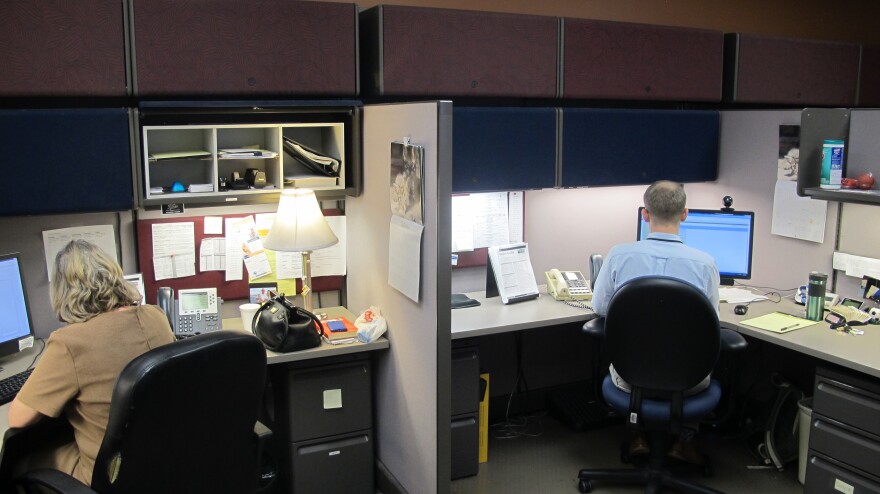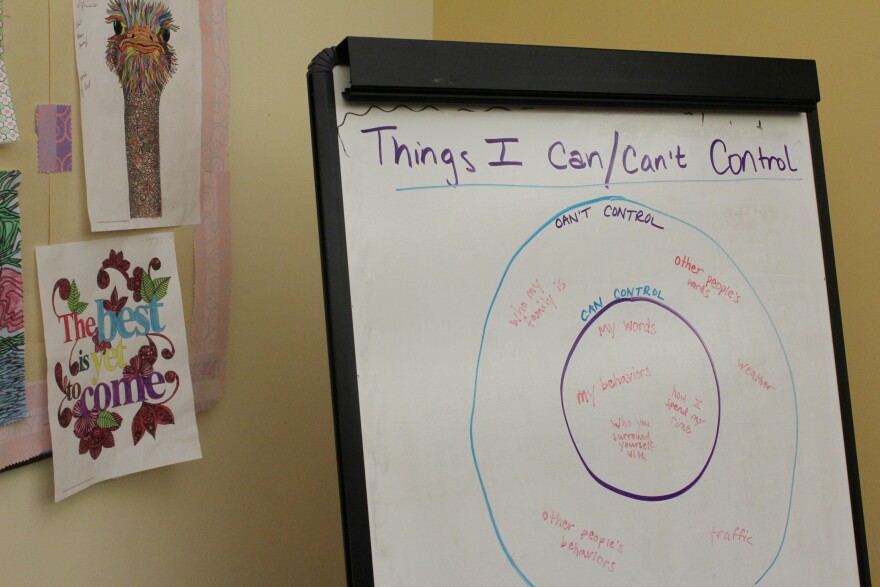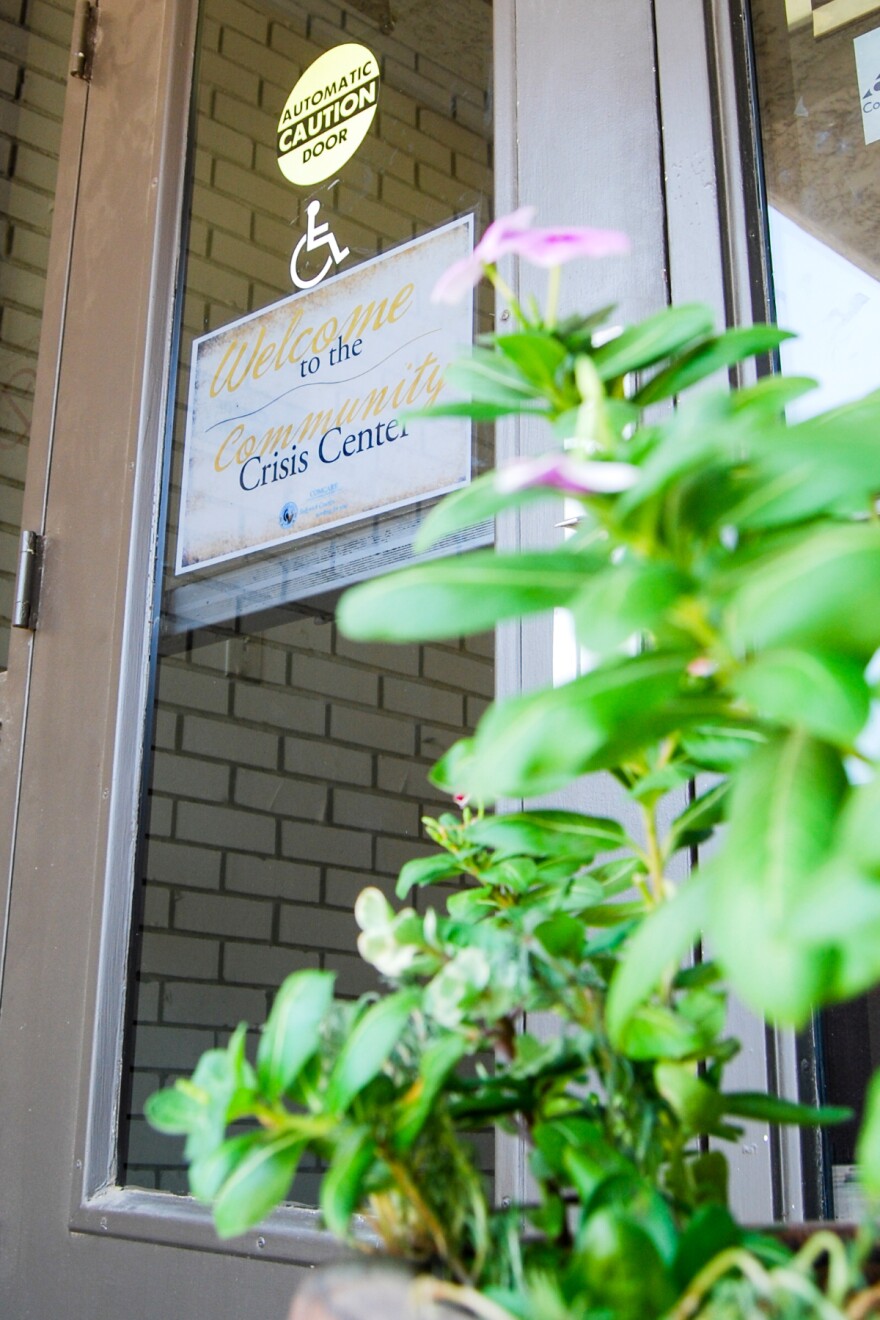Sedgwick County’s Comcare is the state’s largest community mental health agency, and has been helping people with mental illness or substance use disorder for more than 50 years.
Comcare expanded its crisis services last year, and created a model of care that officials say is exceeding expectations. Deborah Shaar reports on the agency’s Community Crisis Center.
The hotline at the Community Crisis Center is staffed 24 hours a day, seven days a week. The men and women who work as crisis case managers answer about 70,000 calls a year from people in Sedgwick, Butler and Sumner counties. That’s roughly 200 calls a day from people who are struggling with mental health issues, or from their concerned family members.

In between all those incoming calls, the crisis case managers do welfare checks and follow-up calls to people who recently received treatment. The hotline is just one of the services provided at the Community Crisis Center in downtown Wichita.
One client, a woman we’re calling Anne, says the center’s outreach makes a big difference in her life.
"When I wanted to just stay in my house and not leave my house for weeks at a time, they call and say, 'Hey, how are you doing?'" she says. "And sometimes I’m okay, but sometimes I’m really struggling, and they can recognize that right away."
Anne is 50 years old and has used crisis services through Sedgwick County’s Comcare programs for most of her adult life.
"I know that I’m alive today and as well as I am because of them," she says.
She struggles with physical injuries and mental illness. Anne has bipolar disorder, a brain condition that causes unusual shifts in mood, energy and activity levels. She also suffers from Post-Traumatic Stress Disorder, or PTSD--the result of childhood trauma.
"I’m no longer capable of staying at home alone," Anne says. "I need someone who can check on me daily and help me with medications and things."
She plans to move in with her sister, which was a hard decision.
"A lot of times I will just go without food and stuff for days because I don’t want to have to call my sister after [her] work and with all her responsibilities, and [have her] drive clear across town to bring me food," Anne says. "Even though she would."

Anne is a regular at the Community Crisis Center. She makes contact several times a month through the hotline, appointments with a therapist, and getting help with medications; and, when daily life gets to be too much, she checks into the Crisis Stabilization Unit for supervised care.
"Whatever your needs are, whatever is going on that’s causing the crisis and the situation and being overwhelmed, they’ll do everything they can to get things set up for you so you can stay in the community and be a part of society," she says.
Anne is one of 7,000 people who have gone to the Community Crisis Center for help during its first year of operation.
Comcare has provided crisis services for more than 20 years in Sedgwick County, but decided to try a new approach by locating mental health services and substance abuse services in one location. Comcare's executive director Marilyn Cook says there were no other facilities in the region offering this kind of coordinated care.

"We knew we needed a facility, a 'one-stop shop,' where people could come to get the help they need without going from system to system," Cook says.
See a timeline of Comcare's 50 years of service.
The Community Crisis Center added some services that Comcare was not already providing, such as a Sobering and Detox Unit. Cook says substance abuse and mental health issues often overlap, so it makes sense to help people get sober so they can talk about what they need to do next.
"Some of them will engage in a treatment process and go from that sobering bed into what we call a social detox bed and on to other levels of treatment that they might need," she says.
The Center also added a 23-hour Crisis Observation Unit to help people work through their immediate situation and spend time with a therapist to decide whether higher levels of care are needed.
"It enabled people to have some time to stabilize, to have a place to come where people could talk to them, help them connect to services and resources they needed, help connect them to medications that they needed and they didn’t have to go to the emergency room where a lot of them were waiting for a long period of time," Cook says.
That’s the main point of the Community Crisis Center: It’s an alternative to jail or the hospital emergency room, and even the state hospital.

Jason Scheck, director of Comcare’s outpatient services, says the center gives law enforcement officers another option when they respond to mental or behavioral health calls.
"They can get in and out of here in a relatively short amount of time, usually five to 15 minutes," Scheck says. "So that’s a pretty quick turnaround that allows them to get back on the streets and do the public safety work that they are hired to do and want to do."

Before the Crisis Center opened, officers had to wait in a hospital emergency room until the person was admitted. That could take hours.
Cook says the Community Crisis Center has already exceeded expectations for cost savings to the community.
"The original study done by [Wichita State University] indicated that this community would save between $4 million and $5 million," Cook says. "The new report indicates a savings of between $17 and $24 million."
Comcare’s data shows that during its first year, the Community Crisis Center reduced EMS transports, jail incarceration rates, hospital costs and state hospital admissions.
"Since this center has been open, we’ve been able to decrease our state hospitalizations, which is good because it’s care that’s closer to home, but it’s also voluntary care," Scheck says. "The big shift that we’ve seen is less reliance on involuntary institutional care and more of a shift towards crisis care close to home."

The crisis center admitted more than 1,000 people to the 23-hour Crisis Observation Unit and more than 1,000 people used the sobering and detox services last year.
For longtime client Anne, a huge step toward progress for her is the day she agreed to come in and talk with a reporter.
"This is good," she said. "This is a good day. The fact that I’m sitting here speaking with you is huge. You have no idea. I haven’t had a conversation for a long time."
Comcare used a $1 million grant from the Kansas Department of Aging and Disability Services to create the Community Crisis Center. The results and outcomes from the first year helped secure another $500,000 from the state.
Cook says they’re working on a long-term funding plan.
"It is our hope that the state will see the savings the actual savings that have happened and make some kind of sustaining contribution to this center," she says. "It does make a lot more sense to treat people at home."
--
Follow Deborah Shaar on Twitter @deborahshaar.
To contact KMUW News or to send in a news tip, reach us at news@kmuw.org.






